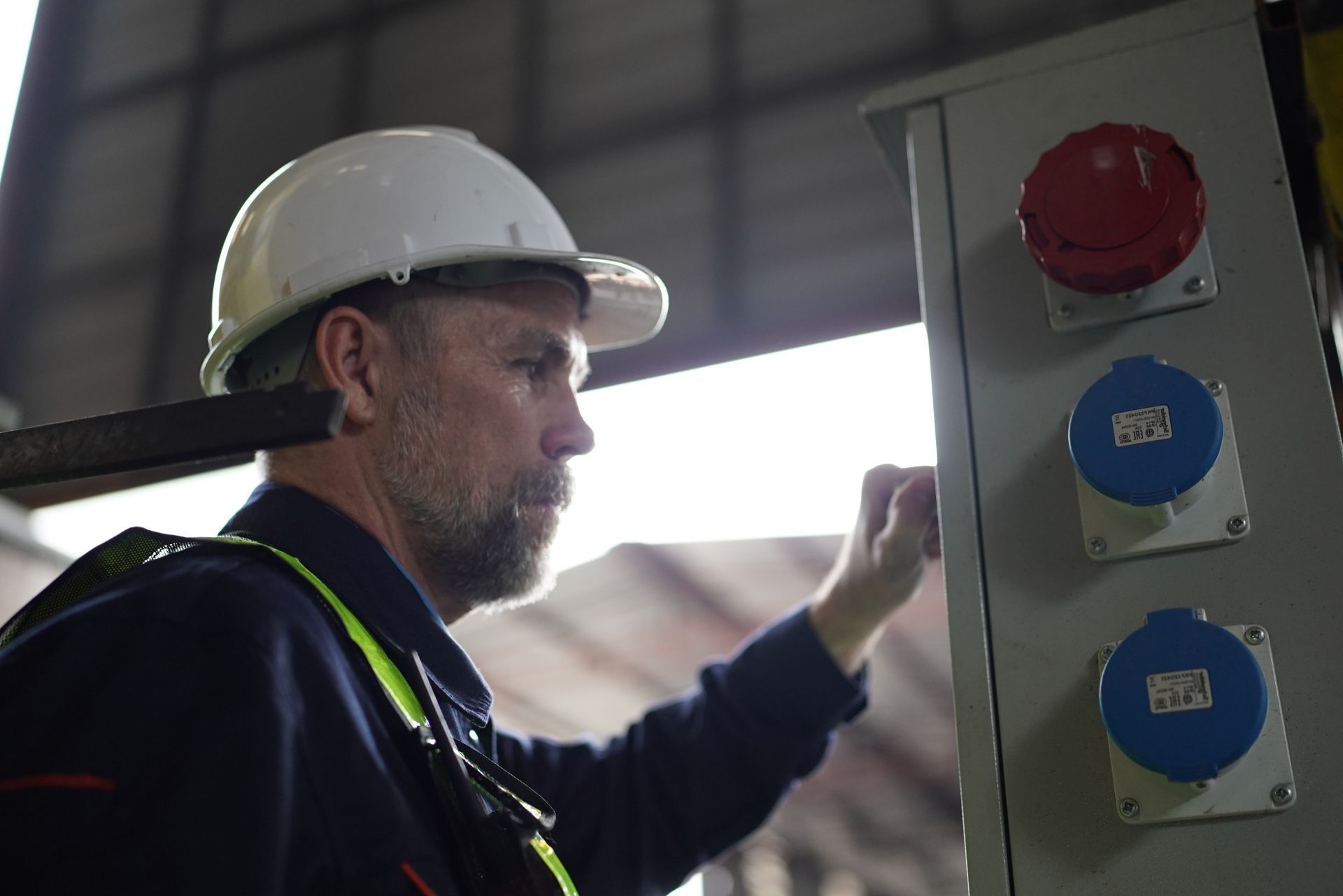South Carolina Electrical Sign Contractor Insurance

9:00am - 5:00pm Mon-Fri
Will Reply in 15min*
Index
Understanding Electrical Sign Contractor Insurance
Legal Requirements in South Carolina
Choosing the Right Insurance Provider
Cost of Insurance for Electrical Sign Contractors
Common Risks Faced by Electrical Sign Contractors
Claims Process for Electrical Sign Contractor Insurance
Contact Us
Phone
864-626-6181
service@southerninsured.com
Location
5 Century Drive Suite 130 Greenville, SC 29607
810 Dutch Square Boulevard, Suite 123 Columbia, SC 29210
In the world of electrical sign contracting, having the right insurance coverage is essential for protecting your business from unforeseen risks. South Carolina, with its growing economy and vibrant commercial landscape, presents unique opportunities and challenges for electrical sign contractors. This article delves into the intricacies of electrical sign contractor insurance in South Carolina, providing a comprehensive guide to ensure that your business is adequately protected.
Understanding Electrical Sign Contractor Insurance
Electrical sign contractor insurance is a specialized form of coverage designed to protect businesses involved in the design, installation, and maintenance of electrical signage. This insurance is crucial for safeguarding against various risks, including property damage, bodily injury, and legal liabilities that may arise during the course of business operations. Given the unique challenges faced by electrical sign contractors, having the right insurance coverage is not just beneficial; it is essential for long-term success and stability in the industry.
Types of Coverage
There are several types of insurance coverage that electrical sign contractors should consider. Each type serves a specific purpose and helps mitigate different risks associated with the industry.
- General Liability Insurance: This is the most fundamental insurance coverage for any contractor. It protects against claims of bodily injury or property damage that may occur on the job site.
- Professional Liability Insurance: Also known as errors and omissions insurance, this coverage protects against claims of negligence or inadequate work that leads to financial loss for clients.
- Workers' Compensation Insurance: Required by law in South Carolina for businesses with employees, this insurance covers medical expenses and lost wages for workers injured on the job.
Why Insurance is Important for Electrical Sign Contractors
Insurance is not just a legal requirement; it is a vital aspect of running a successful electrical sign contracting business. Without proper coverage, contractors expose themselves to significant financial risks that could jeopardize their operations.
For instance, if an employee is injured while installing a sign, the costs associated with medical treatment and potential lawsuits can be astronomical. Similarly, if a sign installation causes property damage, the contractor may face hefty repair bills and legal fees. Insurance acts as a safety net, allowing contractors to focus on their work without the constant worry of financial ruin.
Moreover, having comprehensive insurance can enhance a contractor's credibility and reputation in the marketplace. Clients are more likely to trust a contractor who is adequately insured, as it demonstrates a commitment to professionalism and risk management. This trust can lead to more contracts and opportunities, as businesses often prefer to work with insured contractors to minimize their own exposure to risk. Additionally, many commercial clients may require proof of insurance before awarding contracts, making it a critical factor in securing new business.
Furthermore, electrical sign contractors often face unique challenges related to the nature of their work, such as working at heights, handling heavy equipment, and dealing with electrical components. These factors not only increase the likelihood of accidents but also necessitate specialized training and safety protocols. Insurance not only provides financial protection but can also offer resources for safety training and risk management, further empowering contractors to operate safely and efficiently in a competitive landscape.

Legal Requirements in South Carolina
Understanding the legal landscape surrounding insurance for electrical sign contractors in South Carolina is crucial. The state has specific requirements that contractors must adhere to in order to operate legally and safely.
Mandatory Insurance Policies
In South Carolina, certain types of insurance are mandatory for contractors. These include:
- Workers' Compensation Insurance: As previously mentioned, this coverage is mandatory for businesses with four or more employees. It ensures that workers are protected in the event of an injury on the job.
- General Liability Insurance: While not legally required, many clients and projects will demand proof of general liability insurance before hiring a contractor.
Licensing Requirements
In addition to insurance, electrical sign contractors in South Carolina must also obtain the necessary licenses to operate legally. The South Carolina Department of Labor, Licensing and Regulation (LLR) oversees the licensing process for contractors. To obtain a license, contractors must demonstrate their knowledge of electrical work and pass a qualifying exam.
Furthermore, maintaining a valid license often requires proof of insurance coverage, reinforcing the importance of having the right policies in place. The licensing process also involves a background check, ensuring that contractors have a clean record and are fit to perform electrical work safely. This is particularly important in the electrical sign industry, where safety standards are paramount due to the potential hazards involved with high-voltage installations and outdoor signage.
Contractors should also be aware of the continuing education requirements that may be necessary to keep their licenses current. These requirements can include attending workshops, seminars, or other training programs that focus on the latest electrical codes, safety practices, and technological advancements in sign manufacturing. Staying informed about these developments not only helps contractors comply with legal standards but also enhances their skills and marketability in a competitive industry.
Choosing the Right Insurance Provider
Not all insurance providers are created equal, and selecting the right one can make a significant difference in the level of protection a contractor receives. Here are some key factors to consider when choosing an insurance provider:
Experience in the Industry
It is essential to choose an insurance provider that has experience working with electrical sign contractors. An insurer familiar with the unique risks and challenges of the industry will be better equipped to offer tailored coverage options. Such providers often have a deeper understanding of the specific liabilities that contractors face, including issues related to installation, maintenance, and compliance with local regulations. This expertise can be invaluable when navigating claims or seeking advice on risk management strategies.
Coverage Options and Flexibility
Look for an insurance provider that offers a variety of coverage options. A flexible policy allows contractors to customize their coverage based on their specific needs and the size of their business. This adaptability can be crucial as the business grows or changes. Additionally, consider whether the provider offers add-ons or endorsements that can enhance your policy, such as coverage for equipment breakdown, business interruption, or even cyber liability. These options can provide peace of mind and ensure that you are protected against a wider range of potential risks.
Customer Service and Claims Process
Another critical factor to consider is the quality of customer service and the efficiency of the claims process. A responsive insurance provider that prioritizes customer support can make a significant difference during stressful times, such as when filing a claim after an incident. Look for reviews or testimonials from other contractors to gauge the provider's reputation for handling claims fairly and promptly. A streamlined claims process not only saves time but also helps to minimize the financial impact of unexpected events on your business.
Financial Stability
Lastly, assessing the financial stability of an insurance provider is crucial. A company with strong financial backing is more likely to be able to pay out claims when needed. Researching ratings from independent agencies can provide insights into the insurer's financial health and reliability. Choosing a provider with a solid track record can offer peace of mind, knowing that your coverage will be honored when it matters most
Cost of Insurance for Electrical Sign Contractors
The cost of insurance for electrical sign contractors in South Carolina can vary widely based on several factors. Understanding these factors can help contractors budget appropriately for their insurance needs.
Factors Influencing Insurance Costs
- Business Size: Larger businesses with more employees and higher revenue typically face higher insurance premiums.
- Claims History: A history of claims can increase premiums, as insurers may view the business as a higher risk.
- Coverage Limits: Higher coverage limits generally result in higher premiums. Contractors should assess their risk exposure to determine appropriate coverage levels.
Average Premiums
On average, electrical sign contractors in South Carolina can expect to pay anywhere from $500 to $2,500 annually for general liability insurance. Workers' compensation insurance costs can vary significantly based on payroll and the nature of the work but can range from $1,000 to $3,000 per year.
Additionally, the type of projects undertaken can also play a crucial role in determining insurance costs. For instance, contractors who work on larger, more complex installations may require specialized coverage that can drive up premiums. This includes insurance for equipment breakdowns, which is essential for protecting expensive machinery used in sign fabrication and installation. Furthermore, seasonal fluctuations in work volume can affect insurance needs; contractors may need to adjust their coverage during peak seasons to ensure they are adequately protected against potential liabilities.
Moreover, the geographical location within South Carolina can influence insurance rates. Areas with higher instances of accidents or claims may see increased premiums due to perceived risk. For example, contractors operating in urban centers might face higher costs compared to those in rural areas, as urban settings often present more hazards and legal liabilities. Understanding the local market and working with an insurance agent familiar with the specific risks faced by electrical sign contractors can help in finding the most suitable and cost-effective insurance solutions.

Common Risks Faced by Electrical Sign Contractors
Electrical sign contractors face a variety of risks that can lead to financial loss. Understanding these risks is essential for selecting the right insurance coverage.
Property Damage
Property damage can occur during the installation or maintenance of electrical signage. Accidents such as a sign falling and damaging a building or equipment can lead to costly repairs and legal claims. General liability insurance helps cover these costs. Moreover, the risk of property damage is heightened when working in high-traffic areas or on large-scale projects where the potential for accidents increases. Contractors must also consider the impact of weather conditions, as heavy winds or storms can compromise the integrity of signage installations, leading to further complications and expenses.
Bodily Injury
Injuries to employees or third parties are a significant risk for electrical sign contractors. Whether it’s a slip and fall accident or an injury caused by electrical work, the financial implications can be severe. Workers' compensation insurance protects employees, while general liability insurance covers third-party claims. Additionally, the nature of electrical work often involves the use of heavy machinery and tools, which can pose serious hazards if not handled properly. Regular training and safety protocols are essential to mitigate these risks, but even with precautions in place, the potential for accidents remains a constant concern in this line of work. Furthermore, the emotional toll on employees and their families following an injury can be profound, highlighting the importance of fostering a safe working environment.
Claims Process for Electrical Sign Contractor Insurance
Understanding the claims process is vital for contractors to ensure they can navigate it smoothly when the need arises. Here’s a step-by-step overview of how to file a claim.
Step 1: Report the Incident
As soon as an incident occurs, it is crucial to report it to the insurance provider. This includes gathering all relevant information, such as photographs, witness statements, and any other documentation that may support the claim. Additionally, it is advisable to document the timeline of events leading up to the incident, as this can provide valuable context for the insurance adjuster. The more detailed and organized your report, the better equipped the insurance company will be to assess your claim accurately.
Step 2: Complete the Claim Form
Most insurance providers will require contractors to complete a claim form detailing the incident. Providing accurate and thorough information is essential to avoid delays in processing the claim. Be sure to include specifics such as the date and time of the incident, the location, and any parties involved. If applicable, attach copies of any police reports or incident reports that were filed. This comprehensive approach not only strengthens your claim but also demonstrates your professionalism and diligence as a contractor.
Step 3: Follow Up
After submitting the claim, it’s important to follow up with the insurance provider to ensure it is being processed. Keeping open lines of communication can help expedite the resolution of the claim. Consider setting reminders to check in regularly, and maintain a record of all correspondence with the insurer. This proactive approach can help you stay informed about the status of your claim and address any issues that may arise promptly. Additionally, if you encounter any challenges during the process, don’t hesitate to ask for clarification or assistance from your insurance agent, who can provide guidance tailored to your specific situation.
Best Practices for Mitigating Risks
While insurance is crucial for protecting against risks, implementing best practices can help mitigate those risks in the first place. Here are some strategies electrical sign contractors can adopt to enhance safety and reduce potential claims.
Training and Safety Protocols
Investing in training for employees is one of the most effective ways to reduce accidents and injuries. Regular safety training sessions can help workers understand the risks associated with electrical work and how to avoid them.
Regular Equipment Maintenance
Ensuring that all equipment is regularly inspected and maintained can prevent malfunctions that could lead to accidents. Keeping equipment in top condition not only enhances safety but also demonstrates professionalism to clients.
Conclusion
Electrical sign contractor insurance is a vital component of running a successful business in South Carolina. Understanding the various types of coverage, legal requirements, and best practices can help contractors protect their investments and ensure they are prepared for any challenges that may arise.
By selecting the right insurance provider, staying informed about industry risks, and implementing safety measures, electrical sign contractors can focus on their work with peace of mind, knowing they are adequately protected. In a competitive market, having comprehensive insurance coverage is not just a necessity; it is a strategic advantage that can set a contractor apart from the rest.







